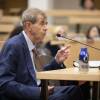While violent crime in Boston is down, some neighborhoods still suffer from alarming levels of gun-related violence. Boston City Councilor and mayoral candidate Annissa Essaibi George Monday toured one of those suffering communities, Dorchester's Bowdoin Geneva area. There, while greeting residents and listening to them talk about public safety, Essaibi George decried what she described as an "increase" in violence and repeated her call for more community policing to fight it.
"We've seen an increase in shootings, we've seen an increase in shots fired, we've seen an increase in loss of life and we've got a lot of work to do to end violence in our city and to support those that are experiencing this trauma," Essaibi George said, standing outside the St. Peter's Parish.
Over the weekend, Boston Police reported five violent crimes — including two homicides — both near the Dorchester side of Franklin Park: two non-fatal shootings and two non-fatal stabbings.
The Boston Police Department's crime overview comparing this year's statistics to last year’s show that, overall, the city has so far had six less fatal shootings, 24 less non-fatal shootings and 40 less total shooting victims than last year.
In the Dorchester neighborhood, which falls under the BPD’s C-11 District, there were six less homicides when compared to last year. The area has seen about two dozen non-fatal shootings so far this year, according to a GBH News analysis of city data. Last year there were 32 non-fatal shootings in the C-11 district.
Essaibi George's comments, part of a new city-wide tour on what she considers difficult topics, echo those of the popular moderate municipal candidates in other cities, like New York and Seattle, where mayoral finalists Eric Adams and Bruce Harrell distinguished themselves in large candidate fields by opposing calls to “defund” police.
Nationwide, progressives have generally responded to defund rallying cries by proposing budget cuts, or money-saving departmental restructuring. Moderates, like Adams, Harrell and Essaibi George, have resisted those calls, proposing instead more measured reforms and, in some cases, increased officers and neighborhood patrols.
Essaibi George, a native of the nearby Savin Hill neighborhood, is the only candidate in Boston's mayoral field who has consistently opposed the reallocation of police money to finance community-based anti-violence groups, or poverty alleviation.
She has said the BPD, which has a current sworn force of about 2,100, needs 200 to 300 additional officers. Her policing plan also calls for hiring a pair of mental health professionals and a pair of social workers in each of the city’s 11 police districts.
"My solutions include investment in community, investment in policing, investment in trust and building better relationships across the board," Essaibi George said. "The only way that we fulfill the promise of community policing is by making sure that our city's residents and community-based organizations that are doing incredible work are able to work in partnership with the Boston Police Department."







